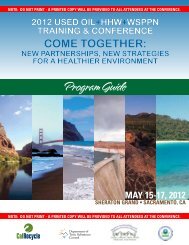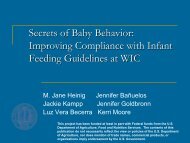Neal Halfon Presentation - Using the EDI for Transforming
Neal Halfon Presentation - Using the EDI for Transforming
Neal Halfon Presentation - Using the EDI for Transforming
You also want an ePaper? Increase the reach of your titles
YUMPU automatically turns print PDFs into web optimized ePapers that Google loves.
<strong>EDI</strong> Scores<br />
30%<br />
25%<br />
20%<br />
15%<br />
10%<br />
5%<br />
0%<br />
100%<br />
80%<br />
60%<br />
40%<br />
20%<br />
0%<br />
100%<br />
80%<br />
60%<br />
40%<br />
20%<br />
0%<br />
100%<br />
80%<br />
60%<br />
40%<br />
20%<br />
0%<br />
Communication Gross<br />
Motor<br />
Fine<br />
Motor<br />
Pacoima Community Dashboard<br />
December 15, 2010<br />
Developmental Progress - % of Children Ages 1-4 Years with Developmental Risk<br />
Problem<br />
Solving<br />
Personal-<br />
Social<br />
Socio-Emotional<br />
High Risk Moderate Risk Expected High Risk Expected Moderate Risk<br />
% of 3rd Grade Children Who are Proficient in Reading<br />
Any<br />
Social<br />
Hardship<br />
% Parents Reporting Reading to Their Child Daily % Children Receiving Developmental Screening<br />
Q1 Q2 Q3 Q4 Q1 Q2 Q3 Q4 Q1 Q2<br />
2009 2010 2011<br />
75%<br />
50%<br />
25%<br />
0%<br />
Dangerous<br />
Neighborhood<br />
% Affected by Hardship Area<br />
Any<br />
Health<br />
Hardship<br />
High Risk <strong>for</strong><br />
Depression<br />
Any<br />
Economic<br />
Hardship<br />
Food<br />
Running Out<br />
Any<br />
Parenting<br />
Hardship<br />
% Parents Asked About Developmental Concerns % Parents Discussing Child Care w/ Child's Doctor % Parents Discussing Local Resources <strong>for</strong> Families<br />
Q1 Q2 Q3 Q4 Q1 Q2 Q3 Q4 Q1 Q2<br />
2009 2010 2011<br />
% Parents Asked About Maternal Depression % Parents Asked About Domestic Violence % Parents Asked About Family Stressors<br />
Q1 Q2 Q3 Q4 Q1 Q2 Q3 Q4 Q1 Q2<br />
2009 2010 2011<br />
% of Children Reached<br />
Q1 Q2 Q3 Q4 Q1 Q2 Q3 Q4 Q1 Q2<br />
2009 2010 2011<br />
Q1 Q2 Q3 Q4 Q1 Q2 Q3 Q4 Q1 Q2<br />
2009 2010 2011<br />
Little Control<br />
Over Life<br />
Q1 Q2 Q3 Q4 Q1 Q2 Q3 Q4 Q1 Q2<br />
2009 2010 2011<br />
Q1 Q2 Q3 Q4 Q1 Q2 Q3 Q4 Q1 Q2<br />
2009 2010 2011<br />
Q1 Q2 Q3 Q4 Q1 Q2 Q3 Q4 Q1 Q2<br />
2009 2010 2011<br />
Developmental Trajectory: Progress by<br />
Kindergarten Entry<br />
• Yellow percentages show <strong>the</strong> % of children who are<br />
developmentally vulnerable<br />
• Red percentages show <strong>the</strong> % of children with an Individualized<br />
Education Plan (special education)<br />
Proportion of Kindergarten Children:<br />
Developmentally vulnerable (%)<br />
Has IEP<br />
Area No. Comm Phys Lang Soc Emo 1+ 2+ (%)<br />
Arleta 105 15 10 4 11 13 30 15 10<br />
Pacoima 397 14 9 11 11 10 26 16 7<br />
<strong>EDI</strong> Scores<br />
Developmental<br />
progress ages 1‐<br />
4 years<br />
Measures of<br />
real‐time<br />
improvement<br />
in health and<br />
education<br />
Reach to <strong>the</strong><br />
population<br />
Pacoima Community Dashboard<br />
December 15, 2010<br />
% of 3rd Grade Children Who are Proficient in Reading<br />
% Affected by Hardship Area<br />
Developmental Progress - % of Children Ages 1-4 Years with Developmental Risk<br />
Any<br />
Any<br />
Any<br />
Any<br />
30%<br />
75% Social Health Economic Parenting<br />
Hardship Hardship Hardship Hardship<br />
25%<br />
20%<br />
15%<br />
10%<br />
50%<br />
5%<br />
0%<br />
Problem Personal- Socio-Emotional<br />
Communication Gross<br />
Fine<br />
Solving<br />
Social<br />
25%<br />
Motor<br />
Motor<br />
High Risk Moderate Risk Expected High Risk Expected Moderate Risk<br />
0%<br />
% Parents Reporting Reading to Their Child Daily % Children Receiving Developmental Screening<br />
100%<br />
80%<br />
60%<br />
40%<br />
20%<br />
0%<br />
Q1 Q2 Q3 Q4 Q1 Q2 Q3 Q4 Q1 Q2<br />
Q1 Q2 Q3 Q4 Q1 Q2 Q3 Q4 Q1 Q2<br />
2009 2010 2011<br />
2009 2010 2011<br />
% Parents Asked About Developmental Concerns % Parents Discussing Child Care w/ Child's Doctor % Parents Discussing Local Resources <strong>for</strong> Families<br />
100%<br />
80%<br />
60%<br />
40%<br />
20%<br />
0%<br />
100%<br />
80%<br />
60%<br />
40%<br />
20%<br />
0%<br />
Q1 Q2 Q3 Q4 Q1 Q2 Q3 Q4 Q1 Q2<br />
2009 2010 2011<br />
% Parents Asked About Maternal Depression % Parents Asked About Domestic Violence % Parents Asked About Family Stressors<br />
Q1 Q2 Q3 Q4 Q1 Q2 Q3 Q4 Q1 Q2<br />
2009 2010 2011<br />
% of Children Reached<br />
Q1 Q2 Q3 Q4 Q1 Q2 Q3 Q4 Q1 Q2<br />
2009 2010 2011<br />
Q1 Q2 Q3 Q4 Q1 Q2 Q3 Q4 Q1 Q2<br />
2009 2010 2011<br />
Dangerous<br />
Neighborhood<br />
High Risk <strong>for</strong><br />
Depression<br />
Food<br />
Running Out<br />
Little Control<br />
Over Life<br />
Q1 Q2 Q3 Q4 Q1 Q2 Q3 Q4 Q1 Q2<br />
2009 2010 2011<br />
Q1 Q2 Q3 Q4 Q1 Q2 Q3 Q4 Q1 Q2<br />
2009 2010 2011<br />
Third grade<br />
reading<br />
41<br />
Social<br />
determinants/<br />
hardships<br />
13







